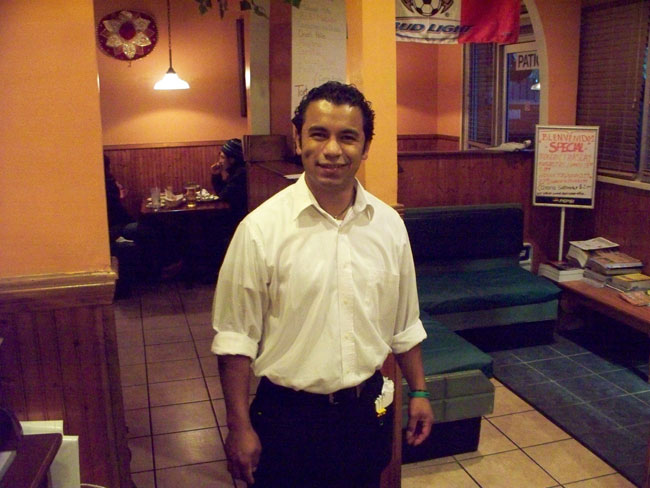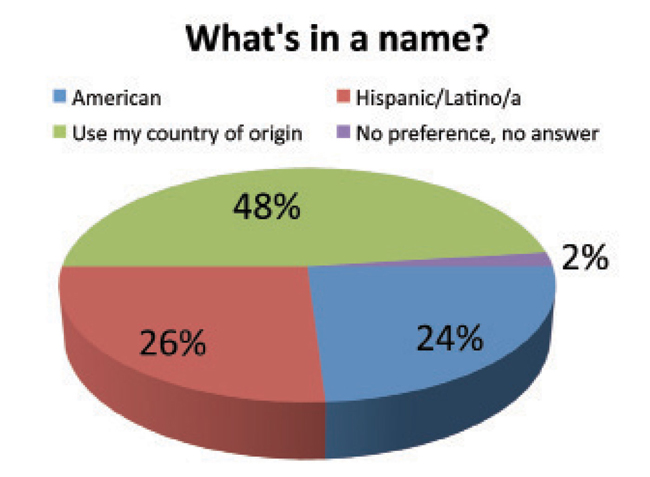
Javier Martínez Vargas, a waiter at El Matador in Johnson City, prefers the word ‘Latino’ to ‘Hispanic.’ (Max Hrenda/Courtesy of etsujournalist.com)
JOHNSON CITY, Tenn. — Javier Martinez Vargas sat in a booth one day last fall, counting the money he made waiting tables that afternoon at El Matador in Johnson City, Tenn.
A customer asked him if he was planning on doing anything for Hispanic Heritage Month. Martinez Vargas, a Mexican national and legal permanent resident of the U.S., shook his head. Then the customer asked him what he thought about the word ‘Hispanic.’
“I don’t really care what they call me,” Martinez Vargas said. “To me, [Latino] sounds better than Hispanic or Mexican.”
Why is that?
“We speak Latin,” he said. “Spanish is a Latin language.”
At first glance, the words ‘Hispanic’ and ‘Latino’ appear to mean the same thing. When you ask the Spanish-speaking community, however, you’ll find that there are plenty of differences between the two.
Hispanic
Hispanic means “pertaining to Spain,” according to Webster’s Dictionary. It refers to a U.S. citizen who lives in a Spanish-speaking home or has family ties to either Spain or another Spanish-speaking country.
In 1976, the White House Office of Management and Budget proposed a law requiring that all Spanish speakers be called Hispanic for U.S. Census data. The law defines Hispanics as “Americans who identify themselves as being of Spanish-speaking background and trace their origin or descent from Mexico, Puerto Rico, Cuba, Central and South America and other Spanish speaking countries.”
Some Spanish speakers have adopted the word ‘Hispanic’ as a sense of pride. Michael Hofius, a U.S. citizen from Guatemala, is one of them.
“Hispanic is an overall term that is used by all of us who are not ashamed of our Spanish or Spanish-American heritage,” said Hofius, who lives in Bristol, Va. “[Hispanics] include every possible racial group and can come from every possible continent, except Antarctica.”

Diego Iglesias, vice president, Bank of Tennessee’s Hispanic Market Division. (Max Hrenda/Courtesy of etsujournalist.com)
Some think that Hispanic only applies to a person’s heritage. Diego Iglesias, an Argentine citizen with legal permanent residence in the U.S., sees a connection between the use of ‘Hispanic’ and naturalized U.S. citizens.
“If I have a kid, I think he or she could consider themselves Hispanic but not necessarily Latino,” said Iglesias, “but that kid’s going to turn out to be full-blown American. To that extent, I think I’d consider him more Hispanic.”
Iglesias, vice president of Bank of Tennessee’s Hispanic market division, said he usually calls himself Argentine.
“For me, Hispanic and Latino mean the same thing,” Iglesias said.
Other Spanish-speakers do notice a difference.
“‘Hispanic’ is a word that just exists in this country,” said Raquel Fratta. Fratta, a graduate student at East Tennessee State University, does not call herself Hispanic.

“I never heard ‘Hispanic’ before I came here. Latina is a much more inclusive word.” said ETSU graduate student, Raquel Fratta. (Max Hrenda/Courtesy of etsujournalist.com)
“I never heard ‘Hispanic’ before I came here,” said Fratta, who is from Paraguay. “‘Latina’ is a much more inclusive word.”
Latino/a
Latino/a means “Latin inhabitant of the United States,” again in Webster’s. It refers to a person of Latin American or Spanish-speaking descent. In 1997, after public debate over the fairness of the term ‘Hispanic,’ the Office of Management and Budget added ‘Latino’ to the census to read: Hispanic or Latino.
The Webster’s definition does not satisfy everyone, however.
“That offends me,” Fratta said. “Anyone from a Latin culture is Latina; you don’t have to be from America.”
Despite Fratta’s claim of the inclusive nature of ‘Latino,’ others don’t see it that way. Hofius, who works closely with the Spanish-speaking immigrant population of Bristol, said there may be a different reason why ‘Latino’ is used in America.
“Many people of Hispanic descent … who are born in the U.S. prefer [‘Latino’] as a way to distinguish themselves from those of us who are immigrants,” Hofius said.
Hofius added that those who prefer to be called Latino are usually found in heavily populated parts of the country, like California, Florida or New York.
“I guess they choose to not be associated with illegal or legal immigrants whom they might consider inferior in any of several ways,” Hofius said.
Contrary to Hofius’ point of view, Martinez Vargas doesn’t see the connection between the use of ‘Latino’ and discrimination against immigrants.
“I don’t think it matters if you’re legal, not legal, however you are,” said Martinez Vargas. “As long as you’re in this country, you’re part of the U.S.”
Parts of the U.S.
You could poll every one of the 45 million or so Hispanics/Latinos currently living in America, and odds are you’d get a different response each time. The Pew Hispanic Center is one of several organizations that are trying to sort out these mixed feelings among Hispanics/Latinos.

In 2006, the Pew Hispanic Center polled 2000 Americans with roots in the Spanish-speaking community and asked how they chose to identify themselves on first reference. Above are the results of the survey. (Graphic by Max Hrenda)
According to a 2008 Pew Center poll, 36 percent of those surveyed preferred ‘Hispanic,’ while 21 percent preferred ‘Latino.’ The remaining 43 percent didn’t favor one over the other.
In another survey, the center learned that 48 percent of Spanish-speaking adults primarily identify themselves by their or their ancestors’ countries of origin. In that same survey, 26 percent called themselves Latino or Hispanic first, and the remaining 24 percent referred to themselves as Americans.
But some think the poll results may be misleading.
“You have to think, who did they talk to in this study?” asked Fratta. “All these people were probably legal or U.S. citizens.” Fratta said she thought illegal immigrants would not talk to pollsters.
In contrast to the Pew Center’s method, the U.S. Census Bureau records information differently. In the Pew Center article “Who’s Hispanic?” Jeffrey Passel and Paul Taylor reported that census-takers usually rely on what people tell them.
“In the eyes of the Census Bureau, Hispanics can be of any race, any ancestry, any country of origin,” wrote Passel and Taylor. “Theoretically, someone who is Chinese could identify himself as Hispanic and that’s how he would be counted.”
The authors suggested that, because of these oversights, the numbers produced by the U.S. Census are often misleading.
Citizens of Portuguese and Brazilian descent, who are not counted as Hispanics under the Office of Management and Budget standard, can be reported as Hispanic if that is what they themselves claim.
Who is Latin-American?
Although Portuguese-speakers do not count as Hispanics in the eyes of the U.S. government, some in the Latino community are willing to embrace them.
Holanda Holtzclaw, secretary for Club Latinoamericano, said that Portuguese-speakers are not only welcome in the Latino community, they’re a part of it as well. “We have Brazilian members,” Holtzclaw said. “(Brazilians) are Latinoamericanos.”
Founded in 1990, Club Latinoamericano works to celebrate and empower the Spanish-speaking community. In the Kingsport, Tenn., group over 20 countries are represented, and they don’t necessarily speak Spanish.
“Anyone whose culture is part-Latin is Latinoamericano,” Holtzclaw said.

“It doesn’t matter where I’m from or what I speak, it just matters that I appreciate who I am.” — Jennifer Garcia. (Max Hrenda/Courtesy of etsujournalist.com)
The four major languages that have Latin roots are: French, Italian, Portuguese and Spanish. Holtzclaw, like Martinez Vargas, said that all Latin cultures are welcome in Club Latinoamericano.
“We don’t have any French members,” said Holtzclaw, “but I guess they’re welcome since they’re a Latin language. We have Italian[s], too.”
It appears that the decision between Hispanic and Latino —or Chicano, Boricua, Mexican, Colombian, etc.— rests with those who have links to these cultures, rather than outsiders who try to label them.
Jennifer Garcia, a senior broadcasting major at East Tennessee State University, does not speak Spanish and has never visited Panama, the country that bore her father. But in knowing her ancestry and culture, she said she is in touch with her Spanish-speaking roots.
“I know more about our [Panamanian] culture than I know the Spanish language,” Garcia said. “It doesn’t matter where I’m from or what I speak, it just matters that I appreciate who I am. I was born and raised in Tennessee and I’m proud to be Hispanic.”
_____
Editor’s note: This story was previously published on El Nuevo Bristol Herald Courier.


I think we as Latinos should be weary of any labels being placed on us, or of any attempts to have labels placed on us. When you think about it weren’t both of those labels given to us by our oppressors? So to be arguing over whether we are Latino or Hispanic brings no real value to anyone nor does it bring value to our cultura which gets a lot of its strength from its diversity. Very interesting and thought provoking article!
I just can’t care less about being labeled as “latino”, “hispanic” or whatever. That’s just the way Americans try to understand a blurry community that’s different from them. Latin america is so diverse that, even being myself South American, I realize that language and blood group are the only things I have in common with some neighboring countries.
Sad to say, but countries like Argentina, Costa Rica o Chile have good education and a quality of life that might match Canada, while some caribbean countries live in absolutely underdeveloped conditions, despite being the most warm, hard working and awesome people you could meet.
Words like “raza” or “Latino culture” are just abstract concepts, just as broad as “Eurasia” or “West Hemisphere”. Probably invented by oppressed groups to gather power or political profit against the host communities.
Labels are meaningless until people learn to associate the labeled community with certain values. The factors that shape those values are the media and experience of the host community members.
Look at the Japanese: in 1940, war propaganda depicted them as evil monkeys. In the 70s, they produced “cheap stuff”. Today they are a smart, technologically advanced country, and even their media and Anime culture has become a role model for millions of teens around the world.